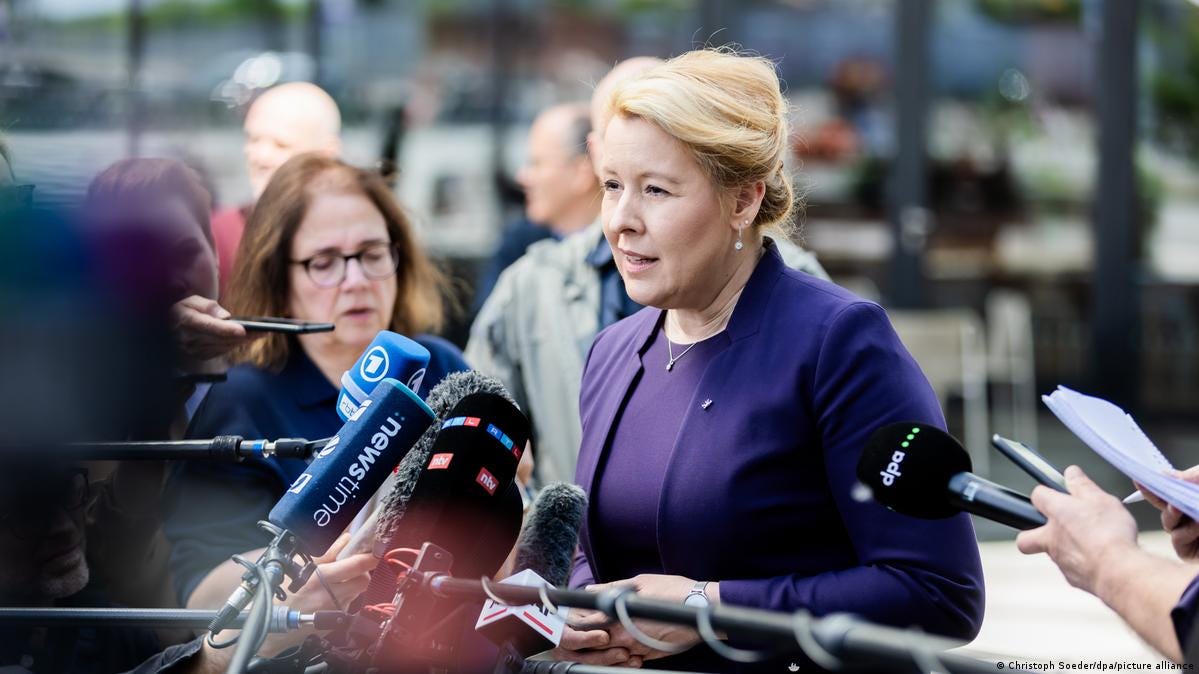Surge in Attacks on German Politicians: Third Politician Attacked Ahead of Elections
In the lead-up to the European Parliamentary elections, Germany has witnessed a troubling rise in violence against politicians. This surge underscores a growing threat to democratic processes and the safety of those serving in public roles.
Assault on Franziska Giffey
Berlin’s senator for Economy, Energy, and Enterprise, Franziska Giffey, was attacked on May 7 while visiting a library in Alt-Rudow, Berlin. A man struck Giffey on the head and neck with a heavy bag, causing her to seek brief hospital treatment. Despite the assault, Giffey quickly returned to her duties, expressing her distress over the increasing "free-wild culture" where violence against politically active individuals is becoming more common. She emphasized the need for a clear boundary against violence, even in a free and democratic society.
Previous Attacks on SPD and Green Party Members
The attack on Giffey follows other recent assaults on politicians. On May 3, Matthias Ecke, a leading candidate for the SPD in the European Parliament elections, was violently attacked in Dresden while putting up campaign posters. Ecke sustained severe injuries, including a broken cheekbone and eye socket, and required surgery. Additionally, on May 9, Yvonne Mosler, a Green Party politician, was pushed and spat on while filming with a TV crew in Dresden.
Government Response and Public Outcry
German Chancellor Olaf Scholz condemned these attacks, labeling them as "outrageous and cowardly." He affirmed that violence has no place in democratic debate and called for respect for those involved in political life. Scholz’s statement highlights a unified stance against political violence, reinforcing the values of decency and democracy.
Escalating Political Tensions
These incidents occur just a month before the European Parliament elections on June 9. The recent violence reflects rising political tensions in Germany, exacerbated by both domestic and international crises. The European Council on Foreign Relations (ECFR) anticipates a significant shift to the right in the upcoming elections. In response, Germany’s right-wing Alternative für Deutschland (AfD) has intensified its campaign efforts, particularly targeting younger voters through platforms like TikTok.
Conclusion
The increase in attacks on German politicians ahead of the European elections is a disturbing trend that threatens the foundation of democratic engagement. As the elections approach, the need for enhanced security measures and a robust response to political violence becomes increasingly critical. The commitment to uphold democratic values and protect those in public service is essential to ensure the integrity and safety of the political process in Germany.
What do you think? We want to hear your opinion!
Be part of the conversation inside the IWB community. Share your opinions and check out the insights of other women in Berlin.
✨ Support International Women in Berlin✨
Help us empower women in Berlin! With every €1 donation, you say a heartfelt 'thank you' to our independent project dedicated to helping women thrive in Berlin. For €5 or €10, enjoy exclusive perks and access to IWB events. Your contribution is vital for us to continue creating a supportive community. 💌 Donate Now – Let's succeed together in Berlin!




